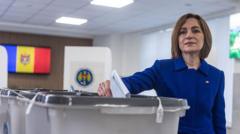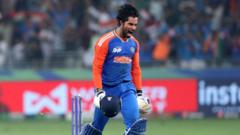Will Russian Interference Impact Moldova's Crucial Election Results?

Published: 2025-09-28 18:20:20 | Category: technology
The recent parliamentary elections in Moldova are pivotal for the country's aspirations to join the European Union, amidst allegations of significant Russian interference. These claims, voiced by both Moldovan authorities and pro-EU President Maia Sandu, highlight the challenges facing Moldova as it grapples with external pressures and internal strife. With preliminary voting results expected soon and a voter turnout exceeding 50%, the future political landscape remains uncertain.
Last updated: 07 October 2023 (BST)
Key Takeaways
- Moldova's parliamentary elections are crucial for its EU integration ambitions.
- Allegations of Russian interference have been made by government officials and President Maia Sandu.
- The ruling Party of Action and Solidarity (PAS) is in a tight race with the pro-Russian Patriotic Electoral Bloc.
- Over 250,000 voters from the diaspora are participating in the elections.
- Security concerns were heightened with bomb scares reported at polling stations.
The Political Landscape Pre-Elections
The parliamentary elections held in Moldova are considered a defining moment for its future. The country, located between Romania and Ukraine, is attempting to navigate the complexities of its geopolitical situation, especially in light of the ongoing conflict in Ukraine. President Maia Sandu's government has positioned itself firmly in favour of EU integration, contrasting sharply with the pro-Russian factions that have historically influenced Moldovan politics.
As the elections approached, concerns regarding external interference intensified, particularly accusations directed at Russia for attempting to sway voter sentiment through disinformation campaigns and financial inducements. President Sandu warned voters of potential consequences, stating, "Don't play with your vote or you'll lose everything!" This statement underscores the high stakes involved, as the results could significantly alter Moldova's trajectory.
Understanding the Key Players
Two major political forces are vying for control of Moldova's 101-seat parliament:
- Party of Action and Solidarity (PAS): Led by President Maia Sandu, this party advocates for pro-European policies and aims to enhance Moldova's integration with the EU.
- Patriotic Electoral Bloc: This coalition includes pro-Russian parties, with notable figures such as Igor Dodon, who have expressed scepticism about the current government's direction and have accused it of stifling opposition.
The political tension is exacerbated by the presence of a pro-Russian separatist enclave, Transnistria, which maintains a Russian military presence and complicates Moldova's unity. Residents of this region, who hold Moldovan passports, face logistical challenges when attempting to vote, often needing to traverse the Dniester river to reach polling stations.
The Role of the Diaspora
One significant aspect of this election is the participation of more than 250,000 voters from Moldova's diaspora, particularly those in pro-Western countries. Their involvement is seen as a crucial factor that could influence the election outcomes, especially given their historical support for pro-European candidates. This demonstrates the importance of the Moldovan diaspora in shaping the political landscape back home.
Security Concerns and Election Integrity
As the elections unfolded, security concerns were heightened by reports of bomb scares at polling stations in several countries, including Italy, Romania, Spain, and the United States, as well as within Moldova itself. Such incidents have raised alarms about the integrity of the electoral process, reflecting the tense atmosphere surrounding the elections. The Moldovan police have been vigilant, reportedly uncovering a concerted effort by Russian operatives to spread disinformation and manipulate voter behaviour.
Despite these challenges, many voters expressed a desire for change. A voter near the Transnistrian border remarked on the dissatisfaction with the current government's performance, indicating a potential shift in voter sentiment that could favour opposition candidates.
Challenges Facing Moldova
Moldova is currently grappling with several pressing issues that impact the electoral landscape:
- High Prices: The economic strain caused by inflation has led to dissatisfaction among the populace.
- Corruption: High levels of corruption within the government have undermined public trust and confidence in political institutions.
- Geopolitical Pressure: Proximity to the ongoing war in Ukraine and the influence of Russia complicate Moldova's political landscape.
These factors contribute to a complex environment where voters are weighing their options carefully. The outcome of the elections could determine whether Moldova continues on its path towards EU integration or shifts back towards a more pro-Russian stance.
What Happens Next?
As partial results begin to emerge, the political dynamics in Moldova will become clearer. If the PAS party retains its majority, it may continue its efforts to align more closely with the EU. Conversely, if the Patriotic Electoral Bloc gains ground, it may signal a significant shift in Moldova's political orientation and its relationship with Russia.
Furthermore, the potential for coalition governments may arise, especially if no single party secures a clear majority. This scenario could lead to political instability as parties negotiate alliances and policy directions amidst external pressures.
Conclusion
The parliamentary elections in Moldova are a critical juncture for the nation. With allegations of Russian interference and the stakes involved in the fight for EU integration, the coming days will be pivotal. Voters are aware that the choices they make could shape the future of their democracy and the direction of their country. As the results unfold, all eyes will be on Moldova and its path forward.
FAQs
What are the main political parties in Moldova?
The two main political parties in Moldova are the Party of Action and Solidarity (PAS), led by President Maia Sandu, and the Patriotic Electoral Bloc, which comprises pro-Russian parties including the Socialist Party led by Igor Dodon.
Why are these elections significant for Moldova?
These elections are crucial as they determine Moldova's political direction, particularly its aspirations for EU integration versus potential closer ties with Russia amid ongoing geopolitical tensions.
What allegations have been made regarding Russian interference?
Authorities in Moldova have accused Russia of attempting to influence the elections through disinformation campaigns and financial inducements to sway voters towards pro-Russian candidates.
How has the diaspora influenced the elections?
The Moldovan diaspora, particularly in pro-Western countries, has mobilised significantly, with over 250,000 voters participating, which could sway election outcomes towards pro-European candidates.
What challenges is Moldova currently facing?
Moldova is dealing with high prices, widespread corruption, and the geopolitical pressures stemming from the ongoing war in Ukraine, impacting voters' perspectives and choices in the elections.



